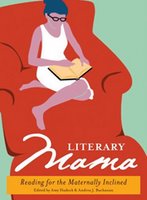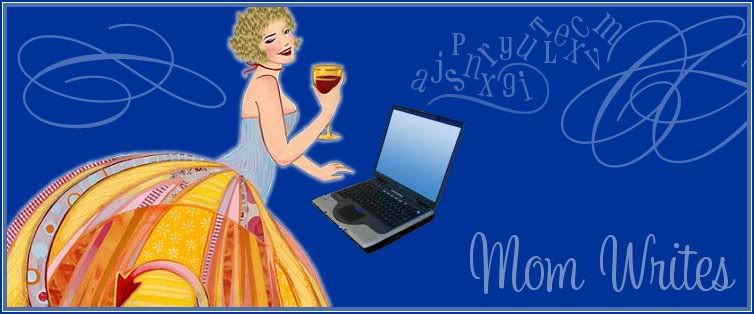Book Review: Literary Mama: Reading for the Maternally Inclined
 Andrea Buchanan, managing editor of literarymama.com and author of Mother Shock: Loving Every (Other) Minute of It and editor of It's a Boy: Women Writers on Raising Sons, and Amy Hudock, editor in chief of literarymama.com and coeditor of American Women Prose Writers 1820 - 1870, have compiled a powerful collection of essays, poems, and short stories written by mothers in Literary Mama: Reading for the Maternally Inclined (Seal Press, 2006).
Andrea Buchanan, managing editor of literarymama.com and author of Mother Shock: Loving Every (Other) Minute of It and editor of It's a Boy: Women Writers on Raising Sons, and Amy Hudock, editor in chief of literarymama.com and coeditor of American Women Prose Writers 1820 - 1870, have compiled a powerful collection of essays, poems, and short stories written by mothers in Literary Mama: Reading for the Maternally Inclined (Seal Press, 2006).Literary Mama features writing that first appeared in the online literary magazine literarymama.com. Judging the book by its title, one might think that Literary Mama contains works solely by mothers about mothering, but the anthology also presents writing that deals with other issues affecting women in their roles as nurturers, whether they are nurturing themselves, their children, or their elderly parents. The book's introduction is helpful in understanding the intent of the book as well as the larger implications of the role of the Internet on the works of women writers (including women bloggers) and the role of women writers in the preserving of women's histories.
The book is comprised of seven sections. The first section is titled "Creative Acts," and features writers whose work puts forth the idea that "creativity is creativity, whether it comes from the physical body or the mind." The second section is titled "Mothers Raising Women, Defining Mothering." The third section is titled "Mothers Raising Men, Exploring Mothering." The fourth section is titled "Sex, Fertility, and the Body," and presents works by writers "challeng[ing] the duality between the virgin and the sex goddess, the angel and the whore." The fifth section is titled "Mothers, Fathers, Parents" and gives us writers who are exploring the role of their childhood in their parenting. The sixth section is titled "Surviving Illness and Loss." The seventh section is titled "Healing the Past to live in the Present" and presents "stories [that] celebrate the heroic internal work that must be done to overcome the past and fully embrace the present."
I couldn’t wait to feast my eyes on this book because reading the words of other mothers is a necessary part of my daily existence. If you are familiar with the writing on literarymama.com, you will recognize many of the pieces in the Literary Mama anthology. I was delighted to see that Barbara Crooker's poem "The Blue Snake Lies Curled in My Bowl Like Oatmeal" and Rebecca Kaminsky's essay "Down Will Come Baby" made it into the book. Both of these pieces spoke to me when I first read them. Crooker's poem explores the creative process involved with raising a child and how the letting go of your work—the work that is your writing and the work that is your child—is inevitable yet painful; Kaminsky's essay is the result of a literal letting go. In it, she dissects her emotions and postpartum depression after she accidentally drops her newborn baby boy. While reading each piece of work, I felt a strong sense of recognition as well as confirmation that the work of a mother is a selfless and a creative act, yet one that often is wrought with worry, with guilt, and sometimes with regret.
The mother as well as the daughter in me was deeply drawn to the section titled "Mothers, Fathers, Parents." So much of whom I am as a mother is based on my experiences of being a daughter. What fascinates me is the circle of nurturing present in the lives of most women. My childhood experiences affect my parenting experiences, which in turn will affect my experiences of being a daughter who nurtures a parent. Even though I am not yet in the position of providing care for an elder, I assume one day I will be, and I feel a keen sense of understanding when I read Sybil Lockhart’s work "Gray." She writes:
"As mother to five-year-old Zoe and one-year-old Cleo, I am so used to being able to fix things, to nourish. I kiss the boo-boos. I serve the food. I gave them my breast when they cried in the night. And I see them heal, grow, learn, flourish. But no matter how much I give to Ma, she only becomes smaller. My children rise up into the light, gathering knowledge, insight, and wisdom. As they play and think and create, becoming clearer and brighter, I can almost see the myriad intricate synaptic connections being sculpted, refined. Simultaneously, Ma’s wiring runs amok; sticky protein oozes into her synapses, and the fibers that structure her neurons begin to crimp and tangle. Ever so slowly she loses comprehension of the world, and as she does, she loses pieces of the person she once was to me. That is how it works, that is how she incites my empathy and my rage in equal parts. I should be able to fix it. I can't."
I have been a reader of literarymama.com since it’s inception in 2003. I find it a happy coincidence that the site launched just weeks before I quit my job to stay home with my then six-month-old daughter. In those early weeks at home alone with a small child, I hungered for words to describe my feelings. I first devoured anything I could find in print or online, including literarymama.com. My hunger to read words quickly turned into a desire to write words and I now consider myself a literary mama. I am a mother and I am a writer, and—because of sites like literarymama.com and anthologies such as Literary Mama—I know that I am not alone.
Literary Mama touched me as a mother, as a daughter, as a reader of literature, and as a writer. The book provides a strong message of hope—from the powerful act of mothers writing, to the power of the words themselves, to the powerful tenacity of the two women who brought the book into fruition for us to enjoy. Thank you to Andrea Buchanan and Amy Hudock in their role as midwives to literary mamas, present and future.
I will leave you with the words of Buchanan, whose essay "The Plant" is the last in the book, its position appropriate and its message powerful for mothers and mother-writers:
"But standing there, watching her dance with excitement as she rushes to the windowsill to check on her plant, seeing her carefully hold it under a stream of water, making sure to saturate the clumps of soil surrounding her sprouts, I feel something. And this time, when I invite that feeling in to consider its purpose, it doesn’t frighten me with its intensity. Instead, I find myself feeling cautiously optimistic, with a strange and surprising confidence that it’s safe to trust whatever might happen next.
It feels a little bit like hope."
***
Technorati tags: book review, literarymama









<< Home